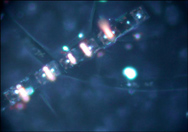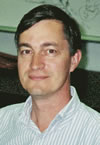| |
| Today
Noon
Employee Activities Assoc.
Yoga Class
Naomi Hartwig
Bldg. 70-191
1 p.m.
Scientific Computing
Extreme Supercomputing
Erik DeBenedictis, Sandia Lab
Bldg. 50A-5132
Monday
Independence Day Holiday
Tuesday
Noon
Computing Sciences Computing the Cosmos
Julian Borrill
Perseverance Hall
|
|
| |
 |
| |
| Morning
Additions: Two Eggs with Ham, Biscuit & Gravy
Origins: Baked Talapia with Sundried Tomato Tapenade
The Fresh Grille: Chicken Nuggets Cup & Fries with Side Salad, BBQ Sauce
Market Carvery: Southwestern Baked Chicken with Black Beans & Corn
|
| B'fast: |
6:30 a.m. - 9:30 a.m. |
| Lunch: |
11 a.m. - 1:30 p.m. |
Full
menu
|
|
|
|
 |
|
|
 |
|
|
|
|
 |
 |
|
|
A fluorescent plankton sample obtained by VERTIGO.
|
|
|
|
Bishop Sets Sail With
VERTIGO Team
|
|
|
|
 |
 |
|
|
Bishop |
|
|
|
Jim Bishop of Berkeley Lab's Earth Sciences Division has joined Ken Buesseler of the Woods Hole Oceanographic Institution and a full crew of other ocean scientists on the three-week VERTIGO cruise aboard the University of Hawaii's research vessel Kilo Moana. VERTIGO, for vertical transport in the global ocean, studies how matter sinks to the bottom of the sea. Bishop's interest is carbon; he's using the multiple-unit large-volume filtration system he engineered, MULVFS, and he'll be testing a Carbon Explorer float equipped with a new optical sediment trap. Go here to join the VERTIGO cruise by way of daily updates.
Former Lab Staff Head UC Davis Lighting Center
The
California Lighting Technology Center (CLTC) has been
created at the University of California, Davis, to develop
energy-efficient lighting with market-friendly design.
Since lighting accounts for nearly a fourth of the nation's
electrical energy consumption, more efficient fixtures
have a tremendous potential for reducing consumption.
Lighting specialists Michael Siminovitch
and Konstantinos Papamichael, both
formerly with Berkeley Lab, head the new facility. Full
story
 |  |
|
|
 |
Lab Closed Monday
For July 4 Holiday
In celebration of the Independence Day national holiday, the Lab will be closed on Monday. The editors of "Today at Berkeley Lab" wish all employees a safe and fun day off.
Encryption Fundamentals Course To Be Offered
Encryption is one of the most potentially powerful security solutions available, yet few genuinely understand how encryption works and the kinds of cryptographic solutions available. The Lab's Computer Protection Program is offering a free course, "Encryption Fundamentals," from 9 a.m. to 2:30 p.m. Thursday, July 15 in Perseverance Hall. Go here to read the course description, and here to sign up.

|
 |
|

|
|
|
 |
|
|
|
|
 |
 |
|
|
Molecular Foundry |
|
|
|
Lab Research Featured in New Campus Webzine
UC Berkeley's College of Letters & Science has teamed up with the College of Chemistry to launch a monthly online research magazine to highlight groundbreaking research in the physical and biological sciences. ScienceMatters@Berkeley will feature a variety of research topics, from biology and mathematics to physics and chemistry. The first issue includes articles about the Berkeley Lab's Molecular Foundry, exploring dark matter, and innovative work on the structure and mechanisms of the hepatitis virus that could lead to new treatments for the disease. Go here to look at the inaugural issue.
Towering Stack of Yucca
Documents Released
The U.S. Department of Energy certified the Nuclear Regulatory Commission to make public on the Internet approximately 1.2 million documents totaling some 5.6 million pages regarding Yucca Mountain. To get a sense of their volume, if the pages were stacked one on top of the other, it would reach a height of approximately 1,800 feet, three times the height of the Washington Monument. Laid end-to-end, these 5.6 million pages would extend approximately 1,000 miles or almost one-half the distance from Washington, D.C. to Las Vegas. Full story.
 |
 |
|
|
|
| |
|

